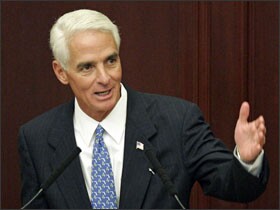As lawmakers in cash-strapped Florida move into a legislative session likely to be dominated by budget issues, Gov. Charlie Crist is urging them to embrace his plan to spend federal stimulus aid on schools and other initiatives, and to increase per-pupil spending for education.
At the same time, the Republican governor used his March 3 State of the State address to repeat his call for legislation requiring school districts to spend 70 percent of their budgets directly “in the classroom for our students and teachers.”
“The federal stimulus bill is not perfect; I’ve never seen a bill that is,” the governor told the GOP-controlled legislature in his speech in Tallahassee. “But this package will provide much-needed tax relief, as well as immediate assistance in education, transportation, unemployment compensation, renewable energy, and other aid and is expected to save or create as many as 206,000 jobs.”

Read more from our updated coverage of the governors’ speeches.
The governor’s $21.5 billion K-12 budget request for the fiscal year that begins July 1 includes $1.5 billion of federal funds through the stimulus package President Barack Obama signed last month. The plan would raise per-pupil spending on average to $7,044, up 2.7 percent. It would raise K-12 spending from the current fiscal year by about $1 billion, or nearly 5 percent.
But Mark Pudlow, a spokesman for the Florida Education Association, an affiliate of both the American Federation of Teachers and the National Education Association that has more than 250,000 members, said his union had some concerns about the governor’s approach to the stimulus.
“He’s using it to paper over a problem this year, and that problem is still going to exist and will resurface unless we look at a permanent source for funding,” he said. “There absolutely needs to be some revenue added to the budget in Florida, not only for schools but for other social programs.”
Republicans Wary

But some Republicans remained cautious about even using the federal stimulus dollars.
“We’ll have to work with the governor, with his staff over the next 59 days [of the legislative session] to come up with the decisions on what, if any, portions of the stimulus package we actually do take,” said Rep. Dean Cannon, a Republican who chairs the House Select Policy Council on Strategic and Economic Planning.
“The governor’s obviously favoring taking all of it,” Rep. Cannon said. “I have some concern that taking all of it may leave us in a worse position two or three years from now than if we maybe take only targeted portions of it.”
Indeed, some analysts have cautioned that a revised state revenue forecast expected this month may reveal a decline in tax collections, which could compel cuts to the current $65.5 billion state budget as well as next year’s. The state’s projected deficit for next year is about $5.5 billion.
Mr. Crist said his proposal for school systems to spend 70 percent of their budgets in the classroom would also seek to “instill transparency” by requiring districts to provide “dollar-by-dollar details online” of their spending.
“Floridians deserve to know how their hard-earned dollars are being spent,” he said, “and parents have a right to demand accountability.”
The Associated Press contributed to this story.





